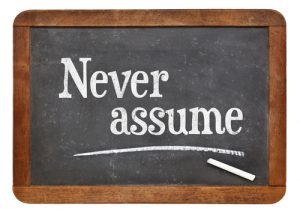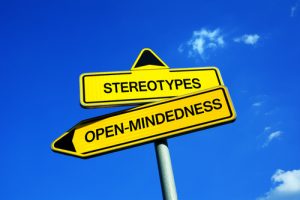Have you ever felt yourself pigeon-holed by someone else?
“Oh, you’re an introvert, you wouldn’t like that.” Or “That’s not the kind of thing you’d want to do.”
Have you ever worked really, really hard to change an aspect of yourself, and then found yourself at a family reunion, or a meeting with someone who has known you from way back when, where their memory of you as you used to be is so strong that it overwhelms any awareness of what you have worked long and hard to become?

“You forget that I remember the real you.”
“You’ve always been that way, might as well accept it.”
Years of self-discipline and determination to change are ignored because of a memory from years ago.
Have you found yourself pigeon-holing others, just because? Pigeon-holing, by the way, is often, though not always, a more politically correct work-around-term to avoid admitting that what is really happening is stereotyping. As a person from England living in the US I find that folks often pigeon-hole (or stereotype) me according to what their perception of an English woman might be, even though I’ve lived in the US for more than half my life.
I know many people who feel that being pigeon-holed by others keeps them stuck, even though they have worked hard, often for years, to change whatever might have led to that perception. Others of course cannot change, nor would they want to, the basis for their being pigeon-holed. We cannot change our race, our age, our height, yet all can lead to pigeon-holing.
“He is tall, so he must have been on the basketball team in high school, must be a good athlete.”
“She is young, so she must not know much.”
“She is old, so she must not know much.”
And so on. When we pigeon-hole people we put them, in our thinking, into a box. Think of the derivation of the word. A pigeon-hole was once a small recess in which pigeons might nest. But then (and this is where our current meaning comes from), it came to mean one of those small slots in a desk into which people sorted paper or envelopes. This paper belongs here, that one there, and so on. Each piece of paper belongs in one specific slot and nowhere else. No matter that one paper might have references to the topic of half a dozen different slots – it belongs in one place only.
Diana is a coach so she belongs in the coach slot. Or she taught addiction counseling so she works with addiction. No matter that I am also a college instructor, a Toastmaster, a writer, a mother, an “off the boat” immigrant, or that I volunteer in support groups for the formerly incarcerated…. you get the drift.
We are all multi-dimensional, and pigeon-holing denies us that, just as it denies us the right to grow and change.
We are Hard-Wired
It is true that we are hard-wired to use information that we have learned in the past, and that hard-wiring does encourage stereotyping. Sadly, though, some stereotypes are not only based on what we have learned, either from parents, from personal experience, or from societal attitudes. They are also based on generalizations. Suzy was once bitten by a dog. Instead of fearing that dog, or perhaps dogs that look like the one that bit her, she is terrified of all dogs. She has generalized from one dog to all dogs. We may do the same in regard to people.
That may be based on personal experience, but other forms of generalization have no basis other than a general ambience in the society in which we grew up. Sexism, racism, age-ism (don’t get me started on any of those three), ability-ism are huge, and extremely harmful generalizations. Not only do they hurt those on the receiving end, but the person making generalizations may be harmed as well. The best candidate for the position that you urgently need to fill may be… fill in with any generalization as to what pigeon-hole does NOT fit your picture of the perfect candidate.
Setting the Right Tone
On that note, one of the most impressive television commercials I have seen in years involved a young African-American woman candidate for a job. She has just been interviewed by a white businessman in a most conservative business background. As I remember it, this is approximately how it ends…
“Well,” he says, “you are not what I have been looking for.” Long pause and her face falls, “But,” he adds with a smile, “you are exactly what we need.”
In acknowledging the stereotype (“not what I have been looking for”) he also tosses it aside, apparently seeing qualities in her that over-ride the superficial “job description” requirements and, instead fit the real needs of his organization.
If only there were more employers like that.
An “un-stereotyping” suggestion
Sometime back a log-time correspondent, Cathy, made a suggestion about un-pigeon-holing. She was referring to an incident where one of her friends (A), in distress over a current situation, had tried to talk with friend B, but had heard back only the feedback about what friend B had pigeon-holed her as having been early on in their twenty-year friendship. Having turned to a friend for support, as we are all told to do in times of stress, she felt totally unheard. Instead of being comforted, she felt worse than before. Fortunately, she turned to Cathy.
Cathy, thoughtful as ever, made a suggestion that I thought should be shared far beyond the confines of that email list, and with her permission I share it with you. She wrote:
“They have known each other for 20 years. That seems like such a long time to be kept in the pigeon hole of someone else’s memory. So, wanting to comfort my friend, I said,
”Well, I decree that tomorrow is ‘Pigeon to butterfly’ day. I decree that every third 18th of the month is Pigeon to Butterfly day. It is the day given us to let go all the ‘definitions’ we have built of people in our lives. We have kept them for so long that we have forgotten the whys and remember only the hole we keep another human being in, in our own minds.”
‘So, if my math is correct, that means that four times a year, if we think of it, we can revise our list of names of people in our mental pigeon hole gallery, and set them free of our preconceptions.
‘So, I guess my goal is to empty my gallery.’

“The butterfly has long been a symbol of transformation. Just as the caterpillar goes through a metamorphosis and eventually emerges from its chrysalis, so we often change our selves and become something very different from what or who we were “back in the day.” We know who we have become, and want to be seen as that. We would not dream of categorizing a butterfly, light and beautiful, as a caterpillar just because that is what it used to be. Why, then, do we turn a blind eye to the progress that the people around us make as they struggle to change and grow?”
Cathy designated the 18th of every third month as Pigeon to Butterfly day – a day when we can resolutely discard the remnants of the pigeon-holes into which we used to try to squeeze those around us. On that day we and they can take on – and henceforth be seen as owning – the attributes of the brilliant and beautiful butterfly.
My only suggestion is that, although we might focus on it on those special “Pigeon to Butterfly days,” we might even endeavor to avoid pigeon-holing our friends and colleagues more frequently than just four time a year. Each of them has butterfly potential. Let us focus on that, and on the progress that they and we are making toward it. Let us do that each and every day!
Be well, be happy, look ahead but never forget to find joy in today,
DianaR
PLEASE! Any re-use of this material should include the words
“Copyright Diana Robinson 2018.”